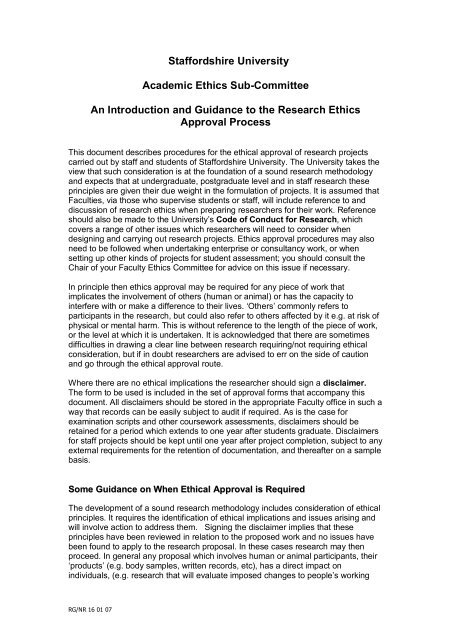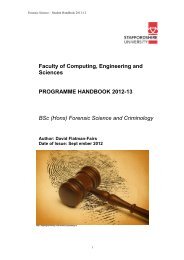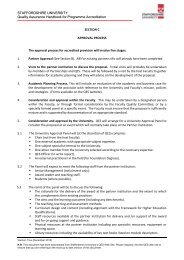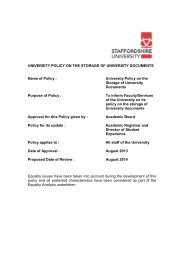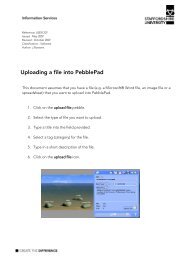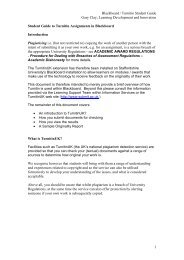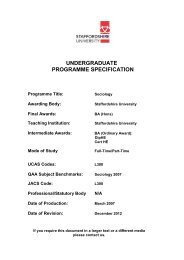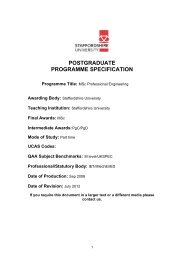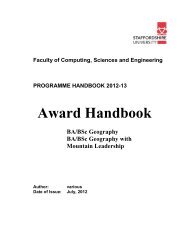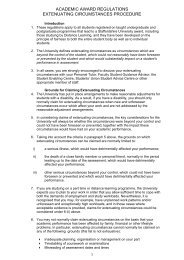Introduction and Guidance about Research Ethics approval process
Introduction and Guidance about Research Ethics approval process
Introduction and Guidance about Research Ethics approval process
You also want an ePaper? Increase the reach of your titles
YUMPU automatically turns print PDFs into web optimized ePapers that Google loves.
Staffordshire University<br />
Academic <strong>Ethics</strong> Sub-Committee<br />
An <strong>Introduction</strong> <strong>and</strong> <strong>Guidance</strong> to the <strong>Research</strong> <strong>Ethics</strong><br />
Approval Process<br />
This document describes procedures for the ethical <strong>approval</strong> of research projects<br />
carried out by staff <strong>and</strong> students of Staffordshire University. The University takes the<br />
view that such consideration is at the foundation of a sound research methodology<br />
<strong>and</strong> expects that at undergraduate, postgraduate level <strong>and</strong> in staff research these<br />
principles are given their due weight in the formulation of projects. It is assumed that<br />
Faculties, via those who supervise students or staff, will include reference to <strong>and</strong><br />
discussion of research ethics when preparing researchers for their work. Reference<br />
should also be made to the University’s Code of Conduct for <strong>Research</strong>, which<br />
covers a range of other issues which researchers will need to consider when<br />
designing <strong>and</strong> carrying out research projects. <strong>Ethics</strong> <strong>approval</strong> procedures may also<br />
need to be followed when undertaking enterprise or consultancy work, or when<br />
setting up other kinds of projects for student assessment; you should consult the<br />
Chair of your Faculty <strong>Ethics</strong> Committee for advice on this issue if necessary.<br />
In principle then ethics <strong>approval</strong> may be required for any piece of work that<br />
implicates the involvement of others (human or animal) or has the capacity to<br />
interfere with or make a difference to their lives. ‘Others’ commonly refers to<br />
participants in the research, but could also refer to others affected by it e.g. at risk of<br />
physical or mental harm. This is without reference to the length of the piece of work,<br />
or the level at which it is undertaken. It is acknowledged that there are sometimes<br />
difficulties in drawing a clear line between research requiring/not requiring ethical<br />
consideration, but if in doubt researchers are advised to err on the side of caution<br />
<strong>and</strong> go through the ethical <strong>approval</strong> route.<br />
Where there are no ethical implications the researcher should sign a disclaimer.<br />
The form to be used is included in the set of <strong>approval</strong> forms that accompany this<br />
document. All disclaimers should be stored in the appropriate Faculty office in such a<br />
way that records can be easily subject to audit if required. As is the case for<br />
examination scripts <strong>and</strong> other coursework assessments, disclaimers should be<br />
retained for a period which extends to one year after students graduate. Disclaimers<br />
for staff projects should be kept until one year after project completion, subject to any<br />
external requirements for the retention of documentation, <strong>and</strong> thereafter on a sample<br />
basis.<br />
Some <strong>Guidance</strong> on When Ethical Approval is Required<br />
The development of a sound research methodology includes consideration of ethical<br />
principles. It requires the identification of ethical implications <strong>and</strong> issues arising <strong>and</strong><br />
will involve action to address them. Signing the disclaimer implies that these<br />
principles have been reviewed in relation to the proposed work <strong>and</strong> no issues have<br />
been found to apply to the research proposal. In these cases research may then<br />
proceed. In general any proposal which involves human or animal participants, their<br />
‘products’ (e.g. body samples, written records, etc), has a direct impact on<br />
individuals, (e.g. research that will evaluate imposed changes to people’s working<br />
RG/NR 16 01 07
environment) or uses contemporary material that may implicate living subjects or<br />
organisations, will need ethical <strong>approval</strong>, <strong>and</strong> cannot be ‘disclaimed’. Projects<br />
involving primary data collection involving human participants/animals will also<br />
always raise ethical issues that must be addressed. For these projects the<br />
University requires all students, staff <strong>and</strong> supervisors to apply for Ethical Approval<br />
using the fast track <strong>approval</strong> form or, if appropriate, the full ethical <strong>approval</strong><br />
application form.<br />
Basic Ethical Principles<br />
In preparation for submitting a research project for ethics <strong>approval</strong>, whether by the<br />
fast-track or full <strong>approval</strong> <strong>process</strong>, the researcher (with supervisory input if the<br />
researcher is a student) should consider the following basic ethical principles.<br />
• Participants’ interests <strong>and</strong> /or rights<br />
• Informed Consent – i.e. the need to inform participants of the aims <strong>and</strong><br />
procedures of the research <strong>and</strong> obtain their agreement to take part on the<br />
basis of this information. Fully informed consent implies knowledge of<br />
everything that might reasonably be expected to influence a participant’s<br />
decision to volunteer, <strong>and</strong> should ideally be obtained via signatures of all<br />
participants. Minimally this should include a statement that participation is<br />
voluntary, what participation involves <strong>and</strong> the potential risks, <strong>and</strong> confirmation<br />
that any queries have been answered. Good practice is to keep information<br />
sheets <strong>and</strong> consent forms separate, <strong>and</strong> signed consent forms should be<br />
stored separately from data to maintain confidentiality.<br />
• Deception – i.e. the need to avoid deception in informing participants <strong>about</strong><br />
the research, or to justify the need for deception if necessary<br />
• Debriefing – i.e. the need to provide participants with additional information<br />
to support them after taking part in the research, <strong>and</strong>/or to provide true<br />
information if deception was necessary originally<br />
• Withdrawal from Investigation – i.e. the need to inform participants of their<br />
right to withdraw from the research at any stage, including during, or at the<br />
end of their involvement or subsequently. These latter circumstances require<br />
that participants are informed of the investigator’s name <strong>and</strong> contact details<br />
• Confidentiality – i.e. the need to reassure participants that information they<br />
provide will not be disclosed to others other than within the context of the<br />
research, or at a minimum will be made anonymous. The distinction between<br />
assurance of confidentiality <strong>and</strong> anonymity may become important for those<br />
wishing to publish quotations from transcripts used in qualitative research.<br />
• Participant <strong>and</strong> researcher safety <strong>and</strong> risk – i.e. the need to avoid harm or<br />
potential harm.<br />
• Possible impact of work on others including as a consequence of publication.<br />
Various professional groups have their own ethical guidelines <strong>and</strong> many of these are<br />
easily available on the Internet <strong>and</strong> can be consulted <strong>and</strong>/or downloaded. Some of<br />
the most useful are those published by the British Psychological Society <strong>and</strong> these<br />
may be consulted by those needing guidance.<br />
RG/NR 16 01 07
Procedures for the Ethical Approval of <strong>Research</strong> Projects<br />
<strong>Research</strong>ers should note at the outset of any application for research ethics<br />
<strong>approval</strong> that the part of the research for which ethical <strong>approval</strong> is sought<br />
must not take place until such <strong>approval</strong> is given.<br />
A summary of the required <strong>process</strong>es is provided in the flow diagrams which<br />
accompany this document, <strong>and</strong> all forms referred to in this document are also<br />
available from the University <strong>Research</strong> <strong>Ethics</strong> website, at<br />
http://www.staffs.ac.uk/academic_ethics<br />
1. <strong>Research</strong>ers who have identified within their project issues that require ethical<br />
<strong>approval</strong> should first complete a draft of the University Fast Track Ethical<br />
Approval Form – Staff or Student version as appropriate. Students should seek<br />
the advice of their supervisor, <strong>and</strong> staff should consult their research mentor <strong>and</strong><br />
/or other appropriate colleagues if appropriate.<br />
2. Where this <strong>process</strong> indicates no significant ethical implications requiring a full<br />
ethics submission, the Fast Track Ethical Approval Form should be completed.<br />
Where significant ethical implications are indicated the researcher should<br />
complete <strong>and</strong> submit the Full Application for Ethical Approval of a <strong>Research</strong><br />
Project form. Supervisors should note, however, that there may be sound<br />
pedagogic reasons why they may wish their students to complete the Full<br />
Application even when it is acceptable to use the fast track approach.<br />
3. For undergraduate <strong>and</strong> postgraduate students the Fast Track Ethical Approval<br />
Form must be signed by the student, their supervisor, <strong>and</strong> one other member of<br />
academic staff. The form should then be stored in the appropriate Faculty Office<br />
in such a way that records can be easily subject to audit if required, <strong>and</strong> for a<br />
time period as indicated above for disclaimers. For staff, their own signature is<br />
sufficient, but a copy of the form should also be sent to the Chair of the Faculty<br />
<strong>Ethics</strong> Panel.<br />
4. In order to facilitate progress <strong>and</strong> avoid delay for undergraduate <strong>and</strong> taught<br />
postgraduate student projects, the Student Fast Track Ethical Approval Form<br />
allows the possibility that ethical <strong>approval</strong> may be granted in principle, subject to<br />
later submission to the supervisor for final <strong>approval</strong> of key documents such as<br />
consent forms, information sheets <strong>and</strong> questionnaires. Students <strong>and</strong><br />
supervisors should note that the part of the research for which ethical<br />
<strong>approval</strong> is sought must not take place until this final <strong>approval</strong> is given.<br />
5. Where significant ethical implications are indicated the researcher should<br />
complete <strong>and</strong> submit the Full Application for Ethical Approval of a <strong>Research</strong><br />
Project form to the relevant Faculty <strong>Ethics</strong> Panel – see below, together with<br />
copies of questionnaires, interview schedules, consent forms <strong>and</strong> participant<br />
information sheets, where appropriate. In addition to requiring the completion of<br />
this form, some researchers may also be required to submit a Risk Assessment<br />
Form. Where this is the case it must be submitted attached to the main form, <strong>and</strong><br />
the Faculty is required to retain a copy of the Risk Assessment.<br />
6. Applications should be submitted for <strong>approval</strong> as early as possible. All projects<br />
must be signed off from an ethics perspective before that part of the work for<br />
which <strong>approval</strong> is being sought begins. Where external funding is sought ethical<br />
<strong>approval</strong> must be gained before the application leaves the University. Faculty<br />
RG/NR 16 01 07
<strong>Ethics</strong> Panels should post information <strong>about</strong> dates of meetings at the start of<br />
each academic year.<br />
7. If projects are approved research may proceed. The applicant <strong>and</strong> supervisor[s]<br />
will receive a letter to this effect. The <strong>approval</strong> letter will indicate the timescale<br />
within which the research must commence in order for ethical <strong>approval</strong> to be<br />
valid. Projects which do not begin within specified timescales must begin the<br />
<strong>approval</strong> <strong>process</strong> again <strong>and</strong> submit a further application for ethical <strong>approval</strong>.<br />
8. If projects are approved subject to amendments the applicant <strong>and</strong> supervisor[s]<br />
will receive a letter to this effect that indicates the minor points that require<br />
clarification. The project should be amended <strong>and</strong> re-submitted to the appropriate<br />
Faculty <strong>Ethics</strong> Panel for <strong>approval</strong>.<br />
9. If projects are not approved because they contain major flaws the applicant <strong>and</strong><br />
supervisor[s] will receive a letter from the appropriate Faculty <strong>Ethics</strong> Panel,<br />
detailing the issues to be addressed. The project must be substantially revised<br />
<strong>and</strong> re-submitted to the Faculty <strong>Ethics</strong> Panel for <strong>approval</strong>.<br />
10. Faculty <strong>Ethics</strong> Panels may choose to defer a decision <strong>about</strong> a project <strong>and</strong> refer it<br />
to the University Academic <strong>Ethics</strong> Sub-Committee for consideration. The<br />
applicant <strong>and</strong> supervisor will receive a letter informing them of the result of the<br />
University’s considerations.<br />
11. The accompanying documents include copies of the forms on which researchers<br />
should be given feedback as to the status of their project after consideration, as<br />
described in 8-11 above. That part of the research project for which ethics<br />
<strong>approval</strong> is sought should not begin until <strong>approval</strong> has been given.<br />
12. If projects which initially have been judged not to have ethical implications<br />
change <strong>and</strong> do subsequently have ethical dimensions it is the responsibility of<br />
project supervisors for all supervised research, or in other cases the staff<br />
responsible for the research, to ensure that ethical scrutiny procedures are<br />
invoked <strong>and</strong> followed through. If projects approved by the fast track <strong>process</strong><br />
subsequently develop additional non-routine ethical dimensions, as indicated by<br />
the questions on the Fast Track Ethical Approval Form, then a Full Application<br />
should subsequently be made to the Faculty <strong>Ethics</strong> Panel.<br />
13. All adverse events occurring during the conduct of research projects must be<br />
reported to the Faculty <strong>Ethics</strong> Panel, or in the case of Fast Track <strong>approval</strong> to the<br />
supervisor (student projects) or Chair of the Faculty <strong>Ethics</strong> Panel (staff projects).<br />
It is likely that the occurrence of adverse effects on projects originally approved<br />
by fast track procedures will trigger the need to make a Full Application for ethics<br />
<strong>approval</strong> if the research is to proceed.<br />
14. Faculty <strong>Ethics</strong> Panels should be notified when research projects are completed.<br />
In the case of fast-track <strong>approval</strong>, supervisors (student projects) or the Chair of<br />
the Faculty <strong>Ethics</strong> Panel (staff projects) should be notified.<br />
15. It is recommended that copies of signed <strong>approval</strong> forms be included in the<br />
Appendices of student dissertation/ project reports.<br />
16. For projects requiring external NHS LREC <strong>approval</strong> please refer to the additional<br />
guidelines provided, Procedures for <strong>Research</strong> Projects Which Require<br />
Application to NHS <strong>Research</strong> <strong>Ethics</strong> Committees. In principle such projects<br />
RG/NR 16 01 07
must be submitted to the Faculty of Health & Sciences Independent Peer Review<br />
Panel for scrutiny, must be authorised by the Deputy Vice Chancellor following<br />
assurance that insurance <strong>and</strong> indemnity arrangements are in place, <strong>and</strong> then<br />
must be submitted directly to the relevant LREC for ethics <strong>approval</strong> using the<br />
st<strong>and</strong>ard COREC form<br />
17. Projects submitted to external funding bodies also need to submit for ethical<br />
<strong>approval</strong> via the Full Application, whatever the nature of the ethical issues<br />
involved. However it may not be necessary to secure full ethical <strong>approval</strong> prior<br />
to submission of the research proposal to the external body. In many cases it will<br />
be sufficient to state that ethical <strong>approval</strong> will be required if the proposal is<br />
successful <strong>and</strong> to indicate how it will be obtained (e.g. ESRC <strong>Research</strong> <strong>Ethics</strong><br />
Framework). Duplication of ethics <strong>approval</strong> should be avoided where<br />
collaborative work is being undertaken.<br />
18. Applicants have right of appeal with regard to the ethics <strong>approval</strong> <strong>process</strong><br />
conducted by the University’s ethics committees if they believe the <strong>process</strong> itself<br />
has not been conducted in line with agreed published procedures. Appeals<br />
should be submitted in writing within 2 weeks of the receipt of the <strong>approval</strong><br />
decision to the Chair of AESC (for complaints against Faculty <strong>Ethics</strong> Panels) <strong>and</strong><br />
to the Chair of Quality Development Committee (for complaints against AESC). It<br />
should be noted that complaints against the academic judgements of reviewers<br />
are not acceptable. Appeals will be considered by an Appeals Panel consisting<br />
of a minimum of 2 independent members of Faculty <strong>Ethics</strong> Panels <strong>and</strong>/or AESC<br />
<strong>and</strong>/or QDC.<br />
19. Participants have the right of appeal under the University’s existing academic<br />
misconduct procedures should adverse events occur during their involvement in<br />
the research.<br />
These procedures are summarised in four flowcharts, one for students, one for<br />
SURF students, one for staff for projects which will not require NHS Local <strong>Research</strong><br />
<strong>Ethics</strong> committee <strong>approval</strong>, <strong>and</strong> a further flowchart which indicates the procedures to<br />
be followed for the health <strong>and</strong> social care related projects which will require external<br />
<strong>approval</strong> from an NHS LREC.<br />
Checklist of Additional Issues to be Considered when completing <strong>Ethics</strong><br />
Approval Forms<br />
• At the outset you should consider where the research is located in relation to<br />
any hazard or difficulty that may arise in relation to:<br />
• Facilities<br />
• Safety<br />
• Other institutions – is permission necessary, has <strong>approval</strong> been<br />
sought from them?<br />
• Other interested parties?<br />
• Purpose of <strong>Research</strong>: project must be supported by:<br />
• Academic/scientific rationale<br />
• Background to project<br />
• Review of existing work<br />
• Aims<br />
RG/NR 16 01 07
• Specific hypotheses to be tested<br />
• Risk Assessment<br />
In planning your work you should ask <strong>and</strong> explicitly define any special ethical<br />
considerations.<br />
• Details of them – justifications<br />
• Potential hazards e.g. in relation to the physical environment for<br />
research<br />
• Potential inconvenience to participants<br />
• Explicit information that will be given to participants<br />
You may need to conduct a specific risk assessment <strong>and</strong> append this to your<br />
proposal.<br />
• Description of Procedures<br />
Your project application should cover the following issues<br />
• Design of project<br />
• What procedures will be followed<br />
• How participants will contribute<br />
• Will project test hypotheses?<br />
• Participants:<br />
You should consider how they are:<br />
• Recruited<br />
• Numbers<br />
• Age<br />
• Gender<br />
• State of Health<br />
• Groups requiring justification, e.g. children, elderly, those with a<br />
mental or physical impairment<br />
You must also consider how the participants will be treated including details<br />
<strong>about</strong>:<br />
• How participants will be informed<br />
• How consent is obtained <strong>and</strong> recorded – Is it written, Is it from a<br />
parent/guardian?<br />
The above should be summarised on an information sheet for participants<br />
You must also ascertain whether or not you need Criminal Records Bureau<br />
clearance in order to proceed with your research. If so this must be obtained<br />
before you begin data collection or other research activities which require this<br />
clearance<br />
• Information <strong>and</strong> Data<br />
Data obtained will be covered by the Data Protection Act therefore you must<br />
explain:<br />
• What data will be obtained<br />
• How will confidentiality be maintained<br />
• Security <strong>and</strong> access to data<br />
• Analysis<br />
• Storing of data <strong>and</strong> disclosure<br />
RG/NR 16 01 07
• Legal Issues<br />
Consider if you need:<br />
• To obtain/seek indemnification<br />
• To Include risk assessment with your application for <strong>approval</strong><br />
<strong>Ethics</strong> Approval Committees<br />
Academic <strong>Ethics</strong> Sub-Committee (AESC) is a sub-committee of Quality<br />
Development Committee. It meets three times year <strong>and</strong> is responsible for the setting<br />
<strong>and</strong> dissemination of policy around research ethics <strong>approval</strong>, the review <strong>and</strong><br />
monitoring of practice, <strong>and</strong> the organisation of awareness training. Membership<br />
includes the Chairs of all Faculty Panels, a representative from the Student Union<br />
<strong>and</strong> a lay member. A Sub-Group of AESC is responsible for <strong>Research</strong> Governance<br />
issues, which need to be followed by projects which require NHS <strong>approval</strong>. AESC<br />
conducts regular audits of Faculty Panel activity, <strong>and</strong> facilitates training opportunities.<br />
Routine ethics <strong>approval</strong> work is now devolved to Faculties. Each Faculty convenes a<br />
Faculty <strong>Ethics</strong> Panel, which also includes lay representation. Meetings are<br />
scheduled as needed, but should be built into the Faculty’s annual calendar in<br />
relation to the regimes for preparing <strong>and</strong> agreeing research projects. Where a large<br />
volume of work is involved, Faculty <strong>Ethics</strong> Panels may devolve responsibility to<br />
Programme Area (or Subject Area) <strong>Ethics</strong> Panels, <strong>and</strong> monitor their activity on an<br />
annual basis. Faculty <strong>Ethics</strong> Panels may refer specific proposals to AESC where<br />
issues arise that they feel unable to assess. Faculty <strong>Ethics</strong> Panels are required to<br />
provide an annual report to AESC summarising the ethics <strong>approval</strong> work carried out<br />
<strong>and</strong> highlighting any issues that have arisen. <strong>Ethics</strong> <strong>approval</strong> work in Faculties may<br />
be subject to audit by AESC.<br />
An additional <strong>Ethics</strong> Panel is located within the Academic Development Institute to<br />
receive proposals from non-Faculty staff. There is an expectation that students on<br />
Staffordshire University awards in partner institutions will work within approved ethics<br />
guidelines, either those of the partner institution (which must be approved by the<br />
University) or our own. <strong>Ethics</strong> Panels in partner institutions should, where possible,<br />
be set up, <strong>and</strong> should report annually to either SURF Quality Committee, the<br />
International Collaboration Sub-Committee or the Flexible Learning Approval Panel.<br />
These committees should provide an annual summary of any issues in need of<br />
consideration to AESC. It is acknowledged that these systems will take a while to<br />
embed, <strong>and</strong> Faculty <strong>Ethics</strong> Panels may wish to support their collaborative awards in<br />
the interim by providing advice <strong>and</strong> receiving proposals. Advice <strong>and</strong> training will be<br />
offered to International Programme Advisers <strong>and</strong> Link Tutors.<br />
RG/NR 16 01 07


